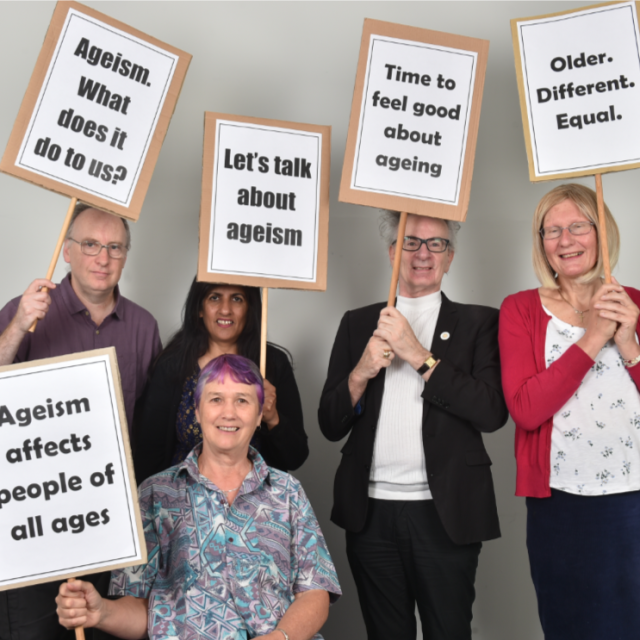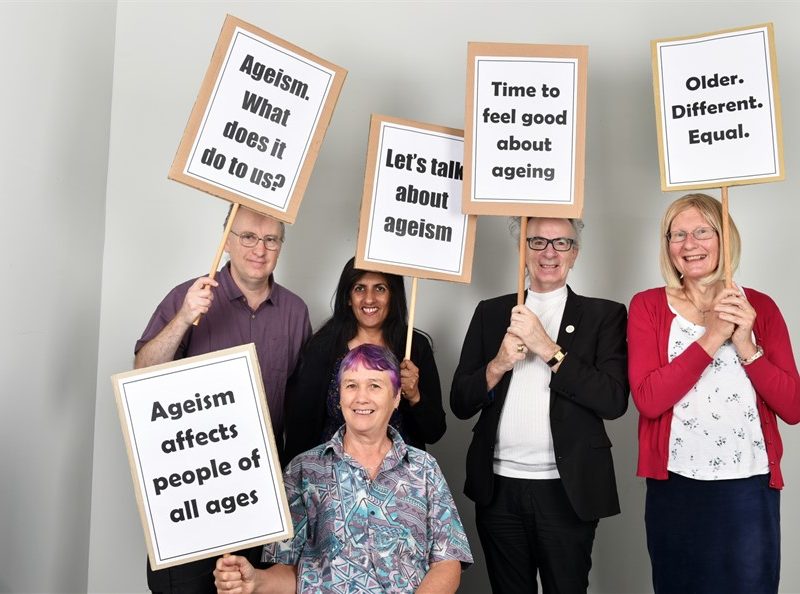Jump to
The Age Proud Leeds campaign ran from 2019 to 2022. It raised awareness of ageism, with a view to changing negative attitudes around ageing and challenging how older people are viewed in society.
This wide-ranging campaign focused on five key areas –
Let’s talk about ageism
Find out how widespread ageism is and how you can get involved in the campaign.
Ageism is discrimination based on a person’s age. It is widespread and can be expressed by people of any age. Many people take on these negative beliefs without even realising it. This has been shown to be harmful, particularly for older people.
The Age Proud Leeds campaign is challenging ageism because we want to celebrate older people as ‘assets’ rather than ‘burdens’.
Ageism affects people of all ages
Younger, middle aged, older? Ageism affects us all.
Ageism is discrimination based on age. Any age. It can, and does, affect us all, at numerous points in our lives.
Watch our film ‘Ageism affects people of all ages’ (YouTube, 4:47)
People often assume that ageism only affects older people, but in a global study The Perennials (carried out by Ipsos MORI), “three quarters of those aged 25-34 felt discriminated against for being too young.”
It is this shared intergenerational experience of being treated unfairly that the second message of the Age Proud Leeds campaign addresses.
As well as direct discrimination from others, a peculiar characteristic of ageism is that we do it to ourselves. As we approach middle-age, we routinely distance ourselves from our ageing selves. But to what end?
“It doesn’t make much sense to discriminate against a group that we aspire to join… Ageism is a prejudice against our own future selves… and takes root in denial of the fact that we’re going to get old. That we are ageing.” (Ashton Applewhite)
We call upon all Leeds citizens – younger, middle-aged and older – to unite against ageism, challenge age-based stereotypes and change negative attitudes to ageing.
Ageism. What does it do to us?
Age discrimination has many negative effects. Having a positive attitude to ageing can help you live well for longer.
The effects of ageism on ourselves and our society are significant and wide-reaching:
Impacts on our physical and mental health, and life expectancy.
Ageism leads to worse outcomes in a number of mental health conditions, including depression, and a number of physical health conditions, including shorter life expectancy.
Affects the quality and accessibility of services we need.
Ageism adversely affects whether or not older patients receive medical treatment and, if they receive the treatment, the duration, frequency, and appropriateness of the treatment.
Affects how much we participate in society and how welcome we feel.
Socially ingrained ageism can become self-fulfilling by promoting in older people stereotypes of social isolation, physical and cognitive decline, lack of physical activity and economic burden.
Affects levels of poverty and our rights at work.
Large numbers of people over the age of 50 feel they are discriminated against, on the basis of age, in recruitment and selection for jobs and promotions. Ageist attitudes have a real economic effect on lives.
Older people are more likely to experience hate crime, institutional and domestic abuse.
Older people are victims of specific forms of harm. It also makes access to protection and justice more difficult for older people.
Creates division between the generations,
A lack of contact, knowledge, empathy and understanding between younger and older people makes our communities worse for everyone.
Older, different, equal
Older people are diverse. Ageing and ageism affect us differently.
Older people are diverse
Grouping all older people together and assuming that their lives are all the same is misleading. It can leave some older people out of the conversation.
* Some older people have lived with poverty for all of their lives and now face their later life with financial and housing insecurity whilst living on small pensions.
* Some older people come from Black, Asian and Minority Ethnic (BAME) communities, some may have migrated to the UK and some are British descendants of migrants.
* Some older people become disabled and disabled people become older.
* Some older people have always been Lesbian, Gay, Bisexual, Transgender or Queer (LGBTQ+) and some come out in their later life.
Ageing and ageism affect us differently
* Older people from some groups are more likely to face poverty and the health issues associated with ageing due to inequalities in our society.
* Older people may face ageism from within their own communities which can increase isolation.
* Different forms of discrimination combine to increase the negative impacts and barriers these groups face. Older people face unconscious bias both on the basis of their age and other characteristics like their gender. A good example of this is women who are facing pension poverty as a result of both their age and structural gender inequality which affects women’s earnings and pension savings. Women who have been affected by the change to the retirement age are campaigning about these issues.
* Older people from BAME communities face both ageism and racism. The Windrush scandal is a good example.
* LGBTQ+ older people may encounter discrimination when they use services, they are less likely to have family to support them and can become isolated and disconnected from their LGBTQ+ communities.
* Disabled people often face new barriers in their later life and older people who become disabled will encounter the same barriers which reduce the life chances of all disabled people. Austerity combined with the problems in the social care system has had a negative impact on older disabled people.
Time to feel good about ageing
Ageing brings many benefits. Share the positives and celebrate the contributions made by older people.
At Age Proud Leeds we want to change the story of older age, to challenge the overwhelmingly negative ideas around ageing that exist in our society, for people of all ages.
We want to celebrate the lives that older people lead and the contributions that they make.
We want to rebalance the story with the facts:
Older people are happier
In global studies (1) which look at happiness over the life course, it has been shown that wellbeing is highest in the early and later stages of human life. Happiness is at its lowest point around middle age, starts to increase after the age of 50, and continues on this trajectory as we move through older age.
“However universal or particular the reasons, most people over 80 report being just as happy, if not happier, than their younger counterparts.” (This Chair Rocks, Ashton Applewhite, 2019)
Older people contribute
Stories found in the media about ‘ageing populations’, usually focus on older people being a drain on society and a threat to our health and social care systems.
However, the evidence actually shows that older people are contributing huge amounts to our economy and our communities:
* Older people are making an annual net contribution of £40 billion to the UK economy
* Social care provided by older people is worth £34 billion a year.
* The value of older people’s volunteering is over £10 billion a year
“Older people are not just recipients, they are contributors. They are not just helped by volunteers, they are the volunteers. This growing proportion of our population should not be seen as an issue but as an asset” (A New Narrative on Ageing, EngAgeNet, 2018)
We know that not everything about getting older is positive. At some point we all face challenges and difficulties, maybe with our health, finances or in our relationships. But these are things that can affect people at any age. If we work together to create Age and Dementia Friendly communities, that adapt to the changing needs of older people, it will help people to remain healthy, independent and connected as they age. Help us change the story of older age!
Project updates
The latest articles about Age Proud Leeds – 5 key messages
Related resources
Reports and files relating to Age Proud Leeds – 5 key messages

